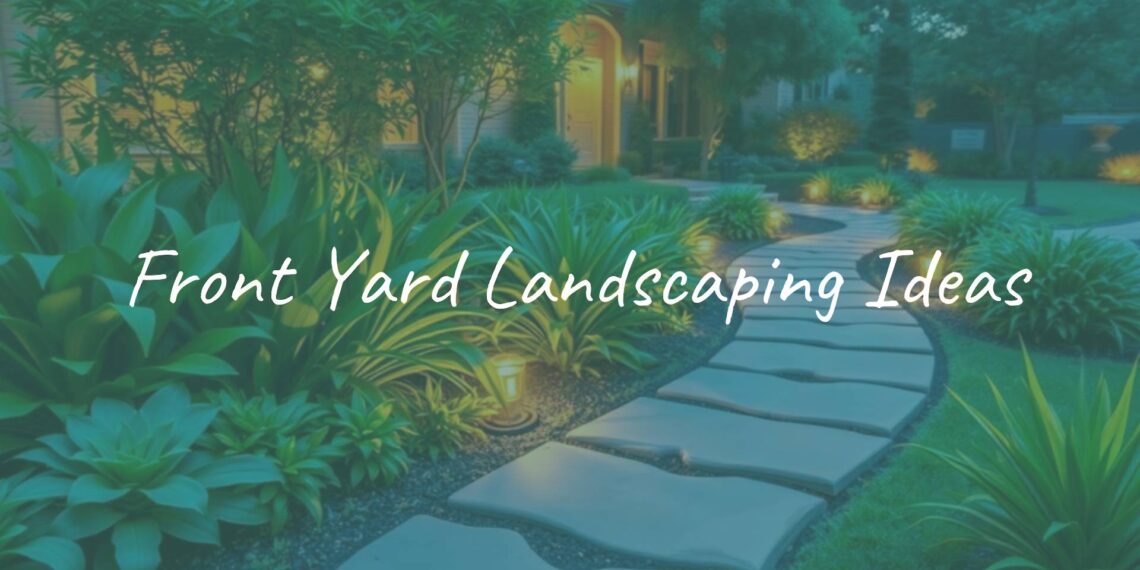Giving your front yard a makeover goes beyond adding a few plants-it’s about shaping a friendly and inviting entry that gives your home great curb appeal before anyone steps through your door. So, what are “front yard landscaping ideas,” and how can they help? These ideas mix smart design, careful plant selection, and built features like pathways or walls, all arranged to boost your home’s look, usefulness, and value. Whether your house is large or small, good landscaping can turn a plain yard into a standout space that feels welcoming.

Maybe you dream of a green garden getaway or something simple and easy to care for-there’s a lot you can do. The process includes getting to know your yard, picking the right features, and blending them together. Here’s how you can turn your front yard from just another patch into a space you and others can enjoy.
Why Is Front Yard Landscaping Important?
Your front yard is more than a set of grass-it sets the tone for your whole home and offers the first impression to all visitors. The way you landscape this area isn’t just about looks; it has real benefits for your property and even your community.
Healthy landscaping can raise your home’s market price and help your neighborhood feel friendlier. A front yard can change with the seasons, help local wildlife, and even offer a peaceful place to sit. Knowing what this space does for you is the first step to making it the best it can be.
How Landscaping Improves Curb Appeal
Curb appeal is the visual charm that makes people stop and look at your home. Nothing boosts curb appeal as much as a well-planned front yard. It’s all about making the outside of your house look neat and attractive, highlighting its best features.
Colorful flower beds, tidy paths, and even small additions like planters or unique house numbers can add character. The aim is to create an inviting, tidy space that draws attention for all the right reasons and makes your home pop in the neighborhood.
Benefits for Home Value and Community Feel
A great front yard does more than look nice-it can also add real value to your home. Homes with nice landscaping stand out to buyers and may sell for more money. It also shows that you take good care of your property, which reassures potential buyers.
A well-kept front yard sets a good example and can motivate neighbors to upgrade their own, lifting the look of the whole street. This makes your community more pleasant and often sparks friendly interactions among neighbors.
How Front Yard Design Affects the Environment
Your landscaping choices matter for the environment, too. Picking plants that are native to your area saves water and avoids harsh chemicals. These plants help local animals, including important pollinators like bees and butterflies.
Adding rain gardens or permeable paving helps manage rainwater, lessening flooding and water waste. Reducing traditional lawn areas and using ground covers or drought-tolerant plants cuts down on mowing, watering, and chemical use, so your yard is easier on the planet.
Front Yard Landscaping: Planning the Basics
Starting new landscaping in your front yard, whether you want big changes or just a few tweaks, begins with a solid plan. Hasty decisions may lead to regret or wasted money. Planning helps you connect your ideas with your yard’s size, climate, and what you can realistically afford and maintain.
You’ll need to look closely at what you have, learn about the local weather and soil, and think about how much you want to spend and how much care you can offer. This will help you pick the right plants and materials for your project.
Understanding Your Yard’s Space and Sunlight
Before you start, take a careful look at your front yard’s shape, size, and how much sun it gets. Is your yard big or small? Knowing the space helps you pick plants and features that won’t look out of place or grow too big or too small.
Check the sun exposure: Does your yard get lots of sun, just a bit, or mostly shade? Sunlight is a big factor for plant health, so choose plants that fit your sunlight pattern. Also look at how water drains, the type of soil, and what’s already there (like trees or slopes), as these affect your choices as well.

Figuring Out Budget and Upkeep
After looking at your space, decide how much time and money you want to spend. Landscaping can be pricey, especially if you add stonework or hire professionals. Budget not only for plants and materials but for things like mulch, tools, or expert help if needed.
Be honest about how much work you’re willing to do later. If you can’t spare much time, choose low-maintenance ideas like drought-tolerant plants or evergreen shrubs that need little care. Plan your design so it fits your lifestyle and won’t become a burden.
Picking a Style That Matches Your Home
Your yard should match your home’s style for a complete, pulled-together look. Think about the style and lines of your house and pick features that go well with it. For example, fancy hedges and brick paths fit classic homes, while clean lines and modern plants suit newer houses.
There isn’t one best style-let your house and taste lead your choices. Maybe you want a wildflower garden, neat shapes, a focus on native plants, or something minimal. Look at photos, walk your neighborhood, and notice what styles catch your eye for inspiration.
Design Tips for a Standout Front Yard
Besides careful planning, great landscaping comes from good design. This means making sure everything looks good together and leads the eye around the space. Think about colors, shapes, and how you can make your yard both interesting and organized.
Let’s look at the design basics to turn a simple patch of grass into a yard to be proud of.
Picking Colors, Shapes, and Textures
Just like inside your home, mixing colors, shapes, and textures in your yard keeps things interesting. Think about plant leaves as well as their flowers. Play with different shades of green or plants with multi-colored leaves for variety. Stick to a few color groups for a tidy look.
Combine upright plants with round ones or spiky ones for contrast. Use smooth stones next to rough bark or mix small leafy plants with broad-leafed ones. This layered look keeps your yard full of interest all year.

Creating Focal Points and Flow
Your front yard should have a main feature that draws attention. This could be a standout tree, a water feature, or your front entrance. Arrange paths, plants, and other features to gently lead the eye toward this spot.
Repeat certain plants or materials to help your yard look connected. Put tall plants in the back and shorter ones in front for depth. Think about how people and eyes will move through the space to create a smooth, welcoming look.
Blending Privacy with Openness
Front yards are a transition between public and private. Find the right mix-too open feels exposed, while tall barriers can seem unwelcoming. Low fences or hedges can add privacy without blocking views, and plantings along busy streets can help reduce noise.
Design open paths to the door to welcome visitors, and use strategic planting so you feel safe but not hidden. The best designs cover security, comfort, and a friendly look.
Highlighting Walkways and Entrances
Paths and entry areas do more than guide guests-they help make strong first impressions. Choose sturdy, easy-to-walk-on materials like pavers, bricks, or gravel. Make walkways wide enough for two people to walk side by side.
Line paths with low plants or lighting to make them stand out. At the entrance, add a pair of plant pots, a decorated porch, or a small archway for a warm, inviting touch. These details help your front yard stand out and feel finished.
Trending Front Yard Landscaping Ideas
Once your plan is set, it’s time to choose specific elements for your yard. Here are some top ideas to help your front yard stand out, whether you want color year-round, easy maintenance, or a yard that helps the environment.
Check out these options and see which ones work best for your yard and style.
Planting Borders for All Seasons
Borders of flowers and shrubs help define your space and add lots of color. Plant a mix that blooms at different times so something is always happening. Try to pick options for spring, summer, and fall so your yard’s colors change throughout the year.
Include evergreens for steady color, and set them as a backdrop for your other plants. This keeps your yard looking good even when nothing else is blooming and helps your landscaping look neat throughout the year.
Building Flower Beds and Layered Gardens
Flower beds give bright color and interest to your front yard. Instead of flat, single rows, make them layered: tall plants in back, medium ones in the middle, and short covers up front.
Layering improves sunlight for all plants and lets you see each variety, creating a lush look. Use perennials for lasting color and fill gaps with annuals for seasonal changes. This set-up also connects your home nicely to the landscape.
Substituting Ground Covers for Grass
Traditional lawns can be high-maintenance, needing lots of water and care. For a less demanding option, use ground covers-these are short, spreading plants that need little mowing or watering.
Pick drought-tolerant varieties or types that suit your climate. These can fill whole areas or sit between beds for texture. They’re a smart choice for water savings and less work.

Using Ornamental Grasses and Flowering Perennials
Ornamental grasses add movement and interest to simple yards. They work year-round and can be mixed with perennial flowers that come back each spring for continuous color and little effort.
Pick grasses and flowers that suit your sun and soil. Mix and match colors and textures for a garden that looks lively and needs less attention than planting annuals each year.
Planting Trees for Shade and Structure
Trees can be the centerpiece of your yard, giving shade, beauty, and a place for birds. When picking a tree, think about how big it will get and where it should go so it won’t cause problems as it grows.
Choose trees with flowers, fall color, or unique shapes for more interest. Trees also help your neighborhood by cleaning air and giving wildlife a home.
Choosing Local, Easy-Growing Plants
If you want a worry-free front yard, pick native plants-they’re already used to your local weather and soil. They need less water, fewer chemicals, and little care once established.
Native plants support local birds and insects, helping your landscape work with nature. Ask at local nurseries for the best choices for your area.
Setting Up a Yard That Handles Drought
Saving water is important in many places, and drought-resistant landscaping helps. With this, you focus on plants that need little extra water once they settle in. This approach is good for all climates and makes caring for your yard easier.
Choose tough plants like succulents, hardy grasses, or lavender. Add gravel or rocks for texture and to help trap soil moisture. This approach saves both water and time.
Hardscape Features to Upgrade Your Front Yard
While plants bring color, hardscape pieces give your yard shape and structure. Paths, walls, seating, and other built features make your yard easy to use and keep it looking good for years.
Let’s look at some popular hardscape additions that add both style and function.
Adding Paths, Stepping Stones, and Walkways
Paths not only guide people but define spaces. A straight walk to the front door feels open, while a gentle curve adds interest. Use pavers, bricks, or gravel for different looks. Flat stepping stones can be casual and blend in well with gardens.
Paths should be wide enough for two people. Add gravel around stepping stones for a softer edge and lower upkeep.

Neat Edging with Pavers or Rocks
Crisp edges make garden beds look organized. Set pavers for a straight line or use rocks for a relaxed, natural border. Rock edges work well in both dry-style gardens and classic beds filled with mulch.
You can also line fences or driveways with narrow rock strips, filling them with low plants for added color and finish.
Building Raised Beds and Walls
Raised beds and low walls add height, contain gardens, and are easy to see from the street. They work well for flowers and even vegetables or herbs. Stone is a smart choice for strength and looks good for years.
For sloped yards, short rock walls help level the space, while gabions (wire cages filled with rocks) offer a modern look and privacy. Raised beds also keep things tidy and easy to reach.
Adding Benches and Porch Areas
Including a place to sit turns your front yard into a comfortable spot to relax and talk with neighbors. A bench by some shrubs or a cozy nook on your porch invites people to enjoy the space.
Even a small bench or chair can make a difference. Porch chairs and colorful decorations help make your entrance friendlier, encouraging neighbors to stop and say hello.
Improving Driveways with Borders and Beds
Driveways can look harsh, but borders of rocks or plants can blend them into your yard. Use shrubs, flowers, or tall grasses to soften the edges and connect the driveway to your landscaping.
If you have a large driveway, planting beds in the center or on the sides add interest and separate parking from the garden.
Front Yard Lighting and Decorative Details
The right lighting and decorative extras add the finishing touch, especially at night. Lights make paths safer and can highlight your favorite plants or features, while things like planters and ornaments show your style and keep things changing with the seasons.
Adding these touches will make your yard unique, both day and night.
Putting In Pathway and Garden Lights
Lighting helps people see where they’re going after dark and can make your garden look great at night. Use small lights along walkways for safety, and highlight special plants or features with spotlights.
Solar lights are easy to install and cheap to run. By spreading lights around, you can use your front yard even in the evening and make your home feel more welcoming.
Highlighting House Numbers and Home Features
Clear, stylish house numbers are important for visitors and emergency services. You can get creative with metal numbers or place them on a unique background to make your house stand out.
Use lights to show off interesting parts of your home, like columns or unique textures. Good lighting makes the house look nice and improves security by removing dark corners.
Adding Water Features and Birdbaths
The gentle sounds of water make any yard more relaxing. Fountains or birdbaths are small changes with a big impact-they attract birds and wildlife while creating a peaceful atmosphere.
Birdbaths are simple and low-cost, while a small fountain can become the standout part of your front yard.
Using Planters and Containers
Pots, planters, and window boxes are perfect for adding color where you don’t have flower beds. They let you swap out plants with the seasons for fresh looks throughout the year.
Try spring bulbs, bright summer flowers, fall mums, or even small evergreens in pots. Window boxes below your windows add instant color to your house front, while tiered planters can make even a paved yard look vibrant.
Bringing in Seasonal Decorations
Celebrate every season by changing up your front yard’s decor. Spring could mean wreaths and new annuals, summer might add hanging baskets, autumn brings pumpkins and warm colors, and winter highlights evergreens and bright branches.
Ornaments, statues, or reused items (like old wheelbarrows turned into planters) let you add your own style and keep the look fresh throughout the year.
Tips for an Easy-to-Care-For Yard
A good-looking yard doesn’t have to take lots of work. You can design a front yard that basically takes care of itself by focusing on easy-care plants and materials that last.
Follow these pointers to save time and energy while still enjoying a beautiful, tidy space.
Picking Low-Care Plants and Hardscape
The best way to keep work low is to choose plants that fit your local sun, water, and soil conditions. Read plant tags and pay attention to final size-plants that need constant pruning or extra care quickly become a chore.
Go for evergreens, small hardy shrubs, or native plants that don’t need special care. Pick quality materials like natural stone or composite decking for paths and structures-they last longer and need less repair.
Controlling Weeds and Using Mulch
Weeding is never fun, but you can make it easier. Use landscape fabric under new beds to block weeds while letting water through. Hold it in place and cut holes where you want to plant.
Cover with mulch-wood chips, bark, or gravel-to stop weeds, keep moisture in, and give a finished look. Reapply mulch every year or two to keep it working and keep beds neat.
Automating Watering and Lawn Care
Automated watering systems, like sprinklers or drip hoses, keep plants happy with less effort. Drip irrigation is especially good for garden beds-it soaks the roots directly with less waste.
If you have grass, consider using a robotic mower or hiring a regular service to keep it neat. The easier it is to care for your yard, the more you’ll enjoy it-without spending your weekends working outside.
Sustainable and Green Landscaping Ideas
More people want yards that look good and help the environment. Eco-friendly landscaping focuses on conserving resources, boosting wildlife, and creating a yard that fits naturally with the local area.
There are lots of ways to make your yard “greener.”
Rain Gardens and Draining Surfaces
Coping with rainwater the smart way helps your yard and the environment. Instead of letting water run off hard surfaces into the street, use rain gardens or paving that lets water sink in.
A rain garden collects water in a shallow spot filled with hardy native plants. Permeable pavers or gravel let rain soak into the ground, reducing runoff and water waste. This helps prevent flooding and keeps your yard healthy.
Helping Birds and Insects
Your front yard can be a mini-habitat for bees, butterflies, and birds. Plant a variety of native flowers and shrubs so there’s always something blooming. Avoid pesticides-they’re harmful to helpful insects and birds.
Add birdbaths or feeders to attract wildlife, and your yard becomes a lively, healthy ecosystem as well as a pretty space.
Reusing Materials and Smart Choices
Try using recycled or salvaged materials for paths, planters, or walls. Old wood, bricks, or containers can be put to new use and add character. If possible, buy supplies made locally to cut down on shipping pollution.
Compost leaves and cuttings to make your own soil booster-this reduces trash and keeps your plants healthy without chemical fertilizers.
Get Inspired for Your Front Yard Makeover
Looking at examples and hearing real stories can spark ideas for your own project. Whether you want a total change or just a small upgrade, these examples show what’s possible-and may help you get started.
Real-Life Yard Examples
- A plain lawn was turned into a peaceful, low-water garden with rocks instead of grass.
- A rose-filled yard became the pride of the block, with neighbors waiting for the blooms.
- An uneven, shady spot was made easy to maintain using native shrubs and paths.
- Along busy streets, long beds with wildflowers and shrubs turned small front yards into colorful gardens.
- Small veggie plots by the curb let neighbors share fresh food.
These ideas show that with a little effort, any yard can become a unique and useful outdoor space.
Tips from the Experts
- If you like lots of color, pick bold flowers.
- If you bike, use an old bicycle as a planter.
- Think about what your yard looks like from inside your house, not just from the street.
Blend what you need with what you love for a space that’s both pretty and practical.
Common Questions about Front Yard Landscaping
Starting a yard project often brings up questions. Here are answers to help guide your planning, whether you’re a beginner or an old pro.
| Question | Answer |
|---|---|
| What are good plants for all-year interest? | Mix evergreens (like boxwood), perennials with staggered blooms, and trees or shrubs with colorful bark or fall color. Choose grasses and hardy bushes for texture even in winter. |
| How can small front yards stand out? | Use vertical planters, trellises, or stacked pots. Pick plants with bold colors or shapes, add a clear focal point, and swap ground covers for grass to create interest with less space. |
| Should I hire a pro or do it myself? | If your plan is complex (with walls or major changes), consider professional help. For small projects, DIY is fine and can be more affordable. Mix approaches for the best results-a pro for big jobs, DIY for the rest. |
With careful choices and a bit of planning, you can turn your front yard into a welcoming, easy-to-care-for space you’ll enjoy every day.
















![What to with Scrap Metal? [infographic]?](https://facts-homes.com/wp-content/uploads/2019/07/645413-POPYOV-391-120x86.jpg)






